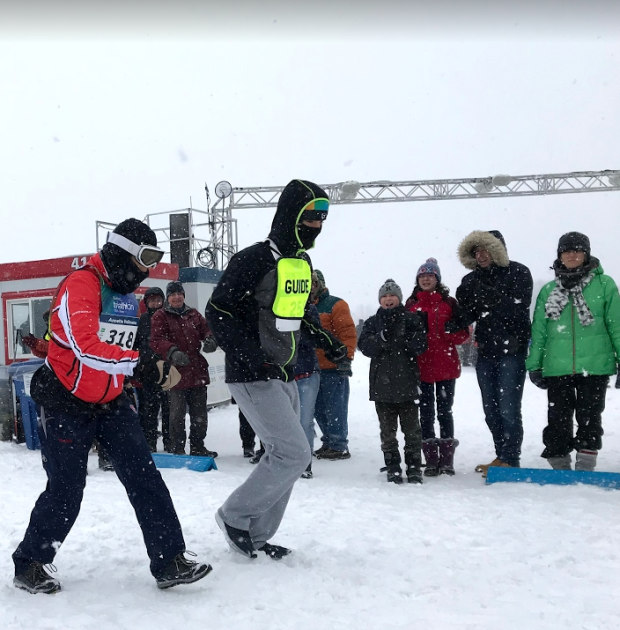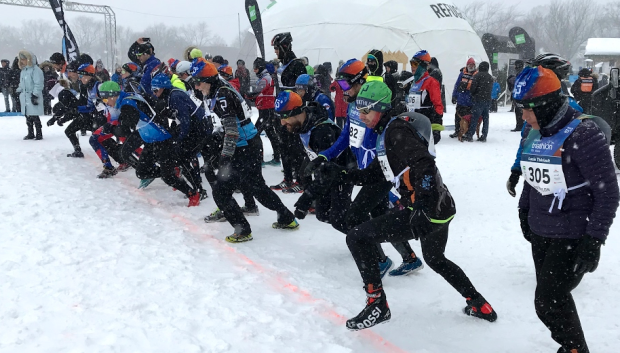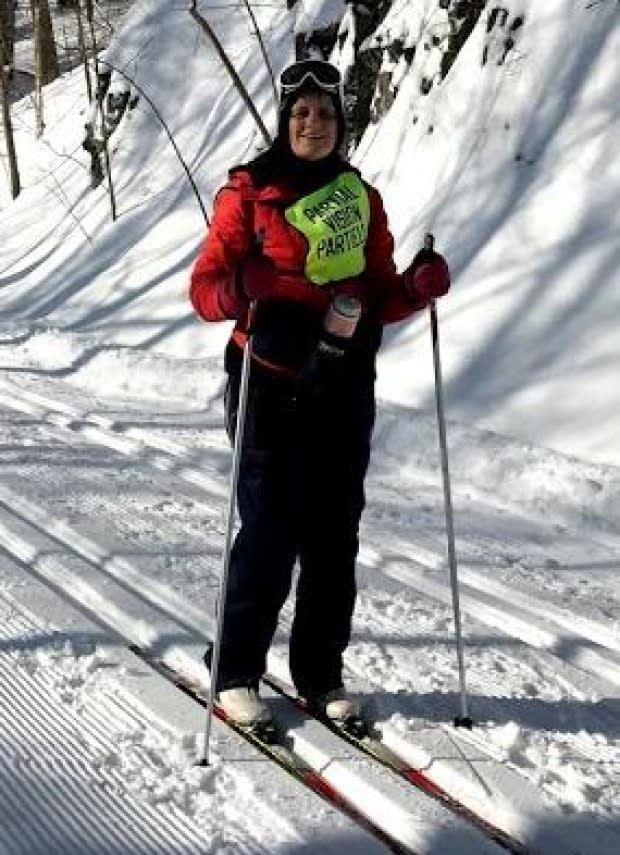Taking it all in stride: Visually impaired triathlete conquers the Plains of Abraham
By the time Annette Hollmann was stepping into her skis to begin the last leg of the ITU Winter Triathlon sprint event in Quebec City last month, the winners of the World Cup race had already uncorked the champagne.
They were blissfully unaware that out in the blinding snowstorm, a 51-year-old skier was still doggedly making her way around the Plains of Abraham.

Her 19-year-old guide, Wilfrid Gendron-Tremblay, ran alongside her in snowshoes, yelling out directions: "Easy left! Now, hard left!"
"At the beginning, we found some remnants of the track," said Hollmann after the race. "But when the track is half-snowed under, it is better not to try to use it, because if you ski by feel like I do, and the track is half there, half not there — that's when you can fall."
Hollmann is nearly blind, so every winter triathlon that she participates in is fraught with danger, no matter what the weather conditions.
But the paratriathlete takes it all in stride.
"I would much rather have this snowstorm than freezing rain," she said. "Skating in this, if you miss a turn, you end up in a nice, soft snow wall. Skiing, if you do fall, you have a soft landing."
'What a triathlon should be'
Hollmann has lived with just 10 per cent vision all her life. She was premature at birth and received too much oxygen in the incubator, which scarred her retinas, causing irreversible damage.
Her limited eyesight didn't hold her back. Living in Houston, Texas, in the 1990s, she took up inline skating "so I could move faster than the mosquitoes."
"I came back to Montreal in 2000," she recalled. "Then here, I realized, 'Hey, this place freezes over half the year.' So I learned how to skate on ice."

She took up marathon speed skating, which is how François Calletta, a speed skater himself and the CEO of Quebec City's annual Pentathlon des neiges, first ran into her and persuaded Hollmann to try a winter triathlon.
Hollmann didn't take much convincing, even though at the time, she'd never been on cross-country skis. She could run, and she could skate. She joined the McGill nordic ski club and took a few lessons.
She signed up for her first triathlon, having been on skis exactly three times.
"For me, this is the pinnacle of what a triathlon should be," said Calletta. "It's all about being accessible. To have someone like Annette taking part, it's the cherry on the sundae."

'Ice is shiny, and snow isn't'
Under normal conditions, Hollmann can skate without a guide, even with her limited vision.
"Ice is shiny, and snow isn't, so I can figure out where the ice is and just stay on it. Also, I'm one of the slowest people out there — so I don't need to worry about finding a gap to pass."
But at this year's event on the Plains of Abraham, the snow was coming down so fast that it blanketed the ice on the skating oval. With the shiny surface obscured, Hollmann had trouble gauging the turns.


Indoor events are much easier for her, which is why she is in Milwaukee, Wis., this weekend for the U.S. Speedskating World Open Marathon. Hollmann will be happy just to complete the 25-kilometre race: she has no illusion about a podium finish.
"I am so out of shape this year," she complained, blaming the less-than-perfect ski conditions this winter in Mount Royal Park.
"I take ski days off from work, whenever there is fresh now," she said. "This winter, every time they sent us snow, they sent us rain right after to wreck everything.
"We need snow cannons on Mount Royal! Wouldn't that be lovely?"
Snow-making equipment for the city's mountain might be a pipe dream, but a safe, outdoor skating oval in Montreal will soon be a reality: the city announced last May it will build a 400-metre, three-lane artificial track, for long track speed skating as well as for recreational use, in Angrignon Park next year.
Bring back the CGV!
For Hollmann, a safe place to train on skates will be a dream come true.

Most summers, Hollmann trains on inline skates on the Circuit Gilles-Villeneuve (CGV). However, the F1 race track on Notre-Dame Island has been all but closed to cyclists and skaters for the past two years, due to the construction of a concert venue in Jean-Drapeau Park.
Hollmann says for someone with limited eyesight like her, the track, with one lane always closed to motorized traffic, is the only safe place to train.
"Normally, as soon as it opens in the spring, I get my spies to check and let me know when they clear the gravel, because I can't see gravel," she explains.
"Then I go on a recon mission: I go very slowly, about 10 km/h, and I memorize which places go crunch under my wheels. That's where I slow down. Then after that, I set my watch to beep at me whenever I go faster than 15 km/h. I don't skate over 15 km/h without a guide.
"Past a certain age, you no longer want to crash at 40 km/h," she says with a laugh.

Thanks to the Association des sports pour aveugles du Montréal métropolitain, a group that pairs up people with impaired vision and sighted volunteers to guide them, Hollmann says she has little trouble finding guides to ski with her in the winter and to pilot her on a tandem bike in summer.
It's harder when an event is out of town.
Gendron-Tremblay, her guide in Quebec City, was a last minute replacement for his grandfather, Pierre Gendron. The teen prepared himself for the task by doing his own "reconnaissance mission" of the ski course the weekend before the race. During the race itself, he kept just ahead of Hollmann, taking note of turns, descents and ascents, and yelling directions back at her.
As it turned out, skiing through a snowstorm with winds gusting up to 70 km/h, Gendron-Tremblay, too, was somewhat handicapped by the near-zero visibility.
"The snow was in our face constantly," he said after the event. "But at the end of the day, it was much easier than I expected" being a first-time guide. He's already making plans to meet up with Hollmann on the Plains of Abraham in 2020.


